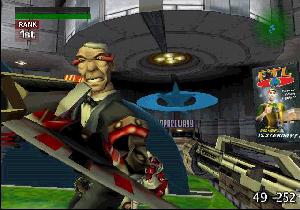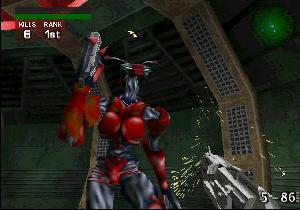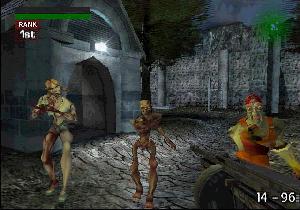88 miles per hour and nowhere to go.
I feel sorry for Christopher Lloyd, star of the Back to the Future series.
People go to Hollywood with all sorts of dreams and ambitions. Some achieve major
stardom and fame. Others find happiness through various acting venues. The rest
either become roadkill on the streets of success or worse…they become typecast.
People see Lloyd as Doc Brown, the raving scientist. Sure, he was in Taxi,
and he even had some memorable bits in movies like One Flew Over The Cuckoo’s
Nest, but most people know him as Marty McFly’s crazy buddy. Like so many
before him, Doc Brown” err, I mean Christopher Lloyd, has been shoved into the
backwater of Hollywood, appearing in collect call commercials and Hollywood
Squares. If only Lloyd had an actual time machine, he could go back and
stop himself from ever accepting the Doc Brown role.
Great Scott! That one change in the space time continuum would change everything!
Lloyd would become a leading man, starring in action flicks. Peace would prevail.
The world would be happy. And maybe someone would fix the dismal single-player
part of TimeSplitters before letting it out the door.
The TimeSplitters are a diabolical force that easily surpasses the
piddling time traveling exploits of Christopher Lloyd. These TimeSplitters
bounce through time from era to era, mucking around in our history. It isn’t
so much a plot as a concept. People from within these eras must fight the TimeSplitters
and put an end to their evil deeds.
The single-player game is heavily mired in Capture the Flag tactics. Each
mission has an item for you to retrieve and an exit location. Every level holds
a different item. So throughout the game, you first run towards the item, then
run towards the exit dealing with enemies in specific locations and following
specific patterns.
Levels are very linear. You pretty much just run from the beginning directly
to the item, with side tangents to gain extra power-ups. This simple formula
is expanded upon later in the game, but stages still have a very direct layout.
Suffice to say, this simple setup isn’t particularly inspiring.
The default control uses the two analog sticks. It takes a while to get used
to it, and even then, I never enjoyed it as much as other console FPS games
like Goldeneye or Medal
of Honor. Control just feels loose, and would have been a lot better with
a “centering” button.
Without a decent plot or radically intuitive gameplay, TimeSplitters
seems more bent on throwing action your way. No cut scenes. No briefings. Everything
is simply left to the bare bone essentials, which makes for a somewhat dry experience.
While not a necessary ingredient, presentation items like cut-scenes and briefings
create a better sense of an environment. Without them, the level designs themselves
are left to pick up the slack. 
Unfortunately, these very surroundings are just plain uninteresting. Walls
are sparse and repetitive. With so many different time periods to romp through,
I hoped to see a heightened level of art and design. Maybe they should have
chosen just three time periods and developed each one completely. Instead, every
level has to be different, and every level ends up being unimpressive.
However, TimeSplitters runs at a high resolution and a spiffy framerate.
This is hands down the fastest first-person shooter for any console system .
But that doesn’t mean a thing when the worlds look so…boring. Plus, the anti-aliasing
problems show up once again in the form of shimmering details here and there.
Honestly, this problem compounded with the off-kilter lens seriously made me
feel nauseous at times.
Musically, it sounds like they found some no-name band from the 80s, handed
them a synthesizer, and told them to go nuts. And go nuts they did. The music
isn’t very good, but at least its usually drowned out by all the blasting and
screaming from the game. Let’s hear it for sound effects!
TimeSplitters isn’t a complete loss, though. The multiplayer mode makes
this game worth the effort. You can toss yourself into the fray against a mess
of computer-controlled bots and up to 3 other human players. The game still
moves fast, and the lens “seasickness” isn’t so sickening on a quarter screen.
But despite the better play in a multi-player deathmatch, the game never lifts
itself above any of its forefathers. Even without the nostalgia factor, I’m
still much happier playing Goldeneye.
As an extra, the game includes a basic map editor to create your own limited
stages. Select different rooms and piece them together. Create different floors
of a structure. You can also make slight changes to each room, like the tint.
It’s not nearly as powerful as a PC level editor, but considering the fact that
this is a console, it’s pretty cool.
TimeSplitters could use a trip in the ol’ Delorean just to realize
what the future of console first-person shooters should be. On this little journey,
it could find out that the single player adventures are becoming deeper and
more involved. The future of gaming will have enthralling and captivating environments.
Everything will be finessed and optimized, resulting in a better all-around
experience. Heed the visions of the future, Eidos, because TimeSplitters
is just more of the same old formula in a candy shell. Take away the coatings
and purportedly new features, and the game finds its way back to its roots –
in the past.

-
Good multiplayer
-
Level editor
-
Lousy single player
-
Boring design elements
-
Control issues







